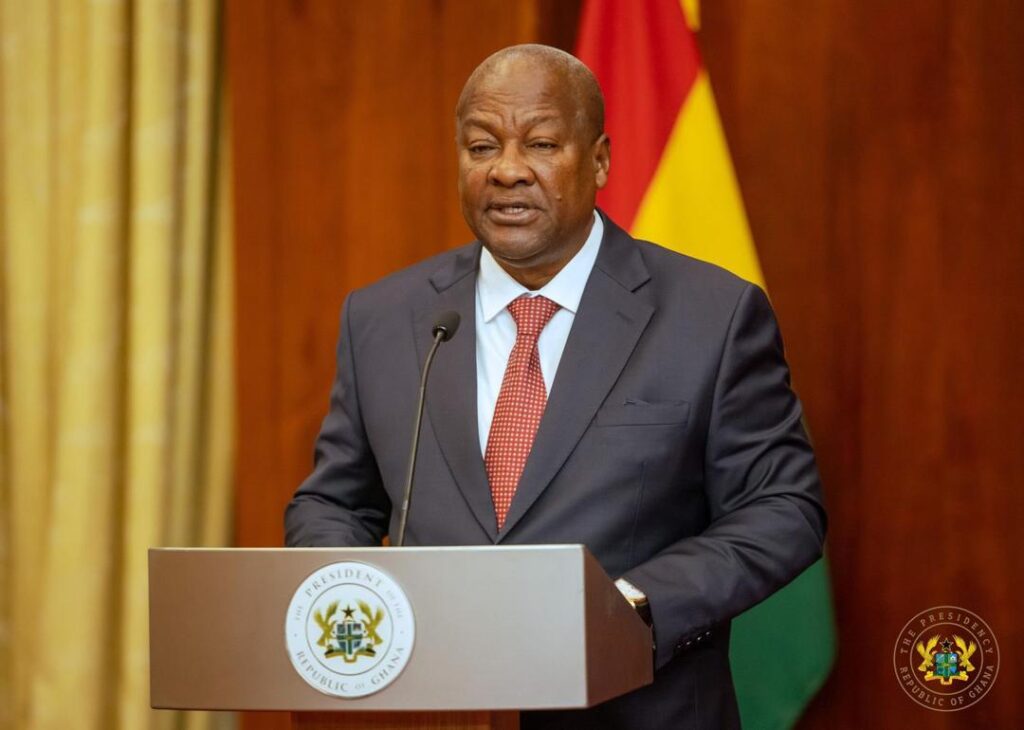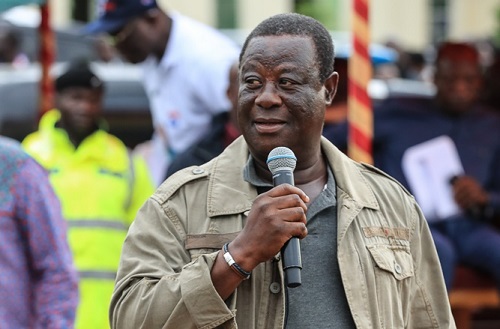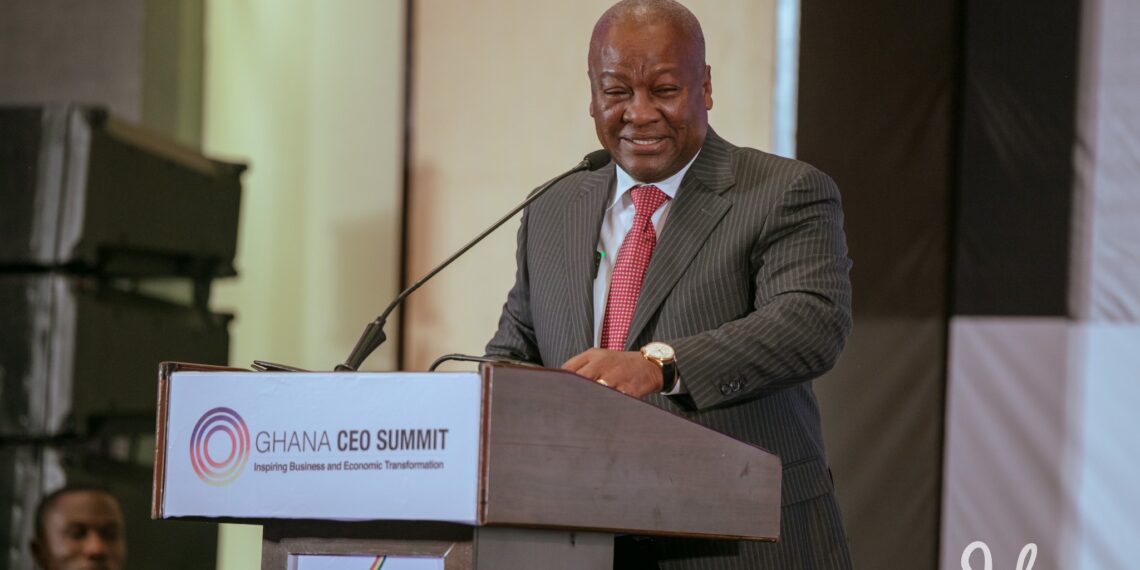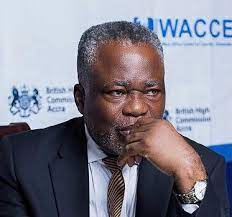At the sidelines of Ghana’s 9th CEO Summit in Accra, President John Dramani Mahama announced a game-changing reform to the country’s road toll regime, detailing a new digitalized system that leverages Ghana’s biometric identity infrastructure to streamline toll collection, eliminate inefficiencies, and enhance public revenue.
In a conversation that merged visionary policy thinking with real-world digital solutions, President Mahama revealed that the reintroduction of road tolls—announced in the national budget—would not rely on the traditional, obsolete model of tollbooths and physical payments.
Instead, Ghana would be rolling out a fully automated, Ghana Card-linked tolling system that directly bills vehicle owners through mobile money and bank accounts using vehicle recognition technology.
“We said in the budget that we’re going to reintroduce road tolls, they’ve been talking about what the modality should be and all that. But the good thing today is every car is linked to the owner’s Ghana Card. We don’t need to have the old toll gates and those cards that you stand and open and all that. We will just go straight digitalized.”
HE President John Dramani Mahama
President Mahama explained that this digital tolling model would involve camera systems that capture a vehicle’s number plate at a tolling point—such as a bridge or a major road—and automatically generate a payment invoice that would be sent to the vehicle owner’s mobile wallet or bank account.
“If it’s one cedi, if you cross the East Legon Bridge, you will just pay. The Governor and the Finance Minister will all be happy. We just take a picture of your car, and then we will take the bill to your mobile money or your bank account and just pay one cedi. Only one cedi. So things are looking up.”
HE President John Dramani Mahama
The President’s speech was part of a larger conversation about how public-private partnerships and local innovation can help Ghana’s digital transformation agenda.

He described a recent experience that demonstrated Ghana’s digital identity ecosystem’s increasing legitimacy on the continent.
Moses Baiden, the CEO of the Margins Group, which put Ghana’s Ghana Card system into place, was the subject of a reference request from a Congolese official.
“A gentleman from DR Congo was asking about Ghana’s ID card, and I said, oh, yeah. Margins did it for us. He said, did they do a good job? I said, yes, they did. So explore that market. The opportunities are endless.”
HE President John Dramani Mahama
President Mahama is promoting an accountable, data-driven, and future-ready infrastructure financing model by establishing the new toll system on the Ghana Card, which is arguably one of the nation’s most ambitious and extensively integrated identity platforms.
In recent years, the Ghana Card has emerged as the cornerstone of many public sector functions, including banking, social services, voter registration, and now road usage.
A Policy Turnaround Rooted in Technology
The reintroduction of tolls is a major change from the previous New Patriotic Party (NPP) government’s November 2021 toll suspension.
The action, spearheaded by Kwasi Amoako-Attah, the Minister of Roads and Highways at the time, was promoted as a way to ease traffic jams and get rid of inefficient toll collection methods.

But the suddenness of the policy, its weak legal foundation, and the lack of a long-term substitute for lost toll money drew harsh public criticism and sparked concerns about the government’s infrastructure funding strategy.
The return of tolls has been presented by President Mahama’s administration as a necessary and strategic step to support funding for maintenance and expansion projects, given the chronic underinvestment and obvious deterioration of road infrastructure throughout Ghana.
However, the new strategy is intended to be intelligent, effective, and fair, in contrast to the previous model, which was marked by physical booths, lengthy lines, and extensive revenue leaks.
The government’s intention to reintroduce road and bridge tolls was officially confirmed by the Ministry of Roads and Highways in February 2025.
The Ministry’s commitment to modernizing the tolling system with digital technologies to ensure transparency and eliminate waste was emphasized in a press release signed by Nasir Ahmadyartey, Head of Public Relations.
The Ministry promised the public that an open, equitable, and competitive procurement process would be used to choose qualified service providers in order to implement the new system.
The administration’s larger commitment to guarantee that every cedi collected in tolls is tracked down and immediately invested back into road infrastructure is reflected in the emphasis on a transparent and economical rollout.
The Ghana Card is used in the proposed system to directly link the use of public infrastructure to accountability, as President Mahama correctly pointed out.
In addition to enabling real-time billing, this connection adds a level of traceability and trust that has long been lacking in the public finance industry.
In practice, the tolling mechanism will rely on license plate recognition technology and a national vehicle database integrated with the Ghana Card registry.
This makes it possible to charge drivers electronically, with no need for cash transactions or the costly infrastructure of tollbooths and personnel.
The political implications of the tolling reform are also notable. Coming just months after his re-election, President Mahama’s assertiveness on infrastructure financing signals a determination to reverse what he has repeatedly described as the “decay of Ghana’s road network” under the previous government.

It also provides a concrete answer to critics who demanded alternative revenue strategies amidst fiscal constraints and IMF-backed expenditure ceilings.
The announcement by President John Dramani Mahama of a digital road toll system powered by the Ghana Card represents a major shift in the country’s infrastructure and governance story.
The digital toll model provides Ghanaians with a sustainable way to fund their roads, one that they can see, trust, and even be proud of, by doing away with the inefficiencies and disputes that beset the previous tollbooth system.
Implementation integrity, inter-agency cooperation, and ongoing political commitment will determine whether the plan lives up to its lofty promise.
READ ALSO: President Mahama Charts Bold Course for Ghana’s Economic Reset


















